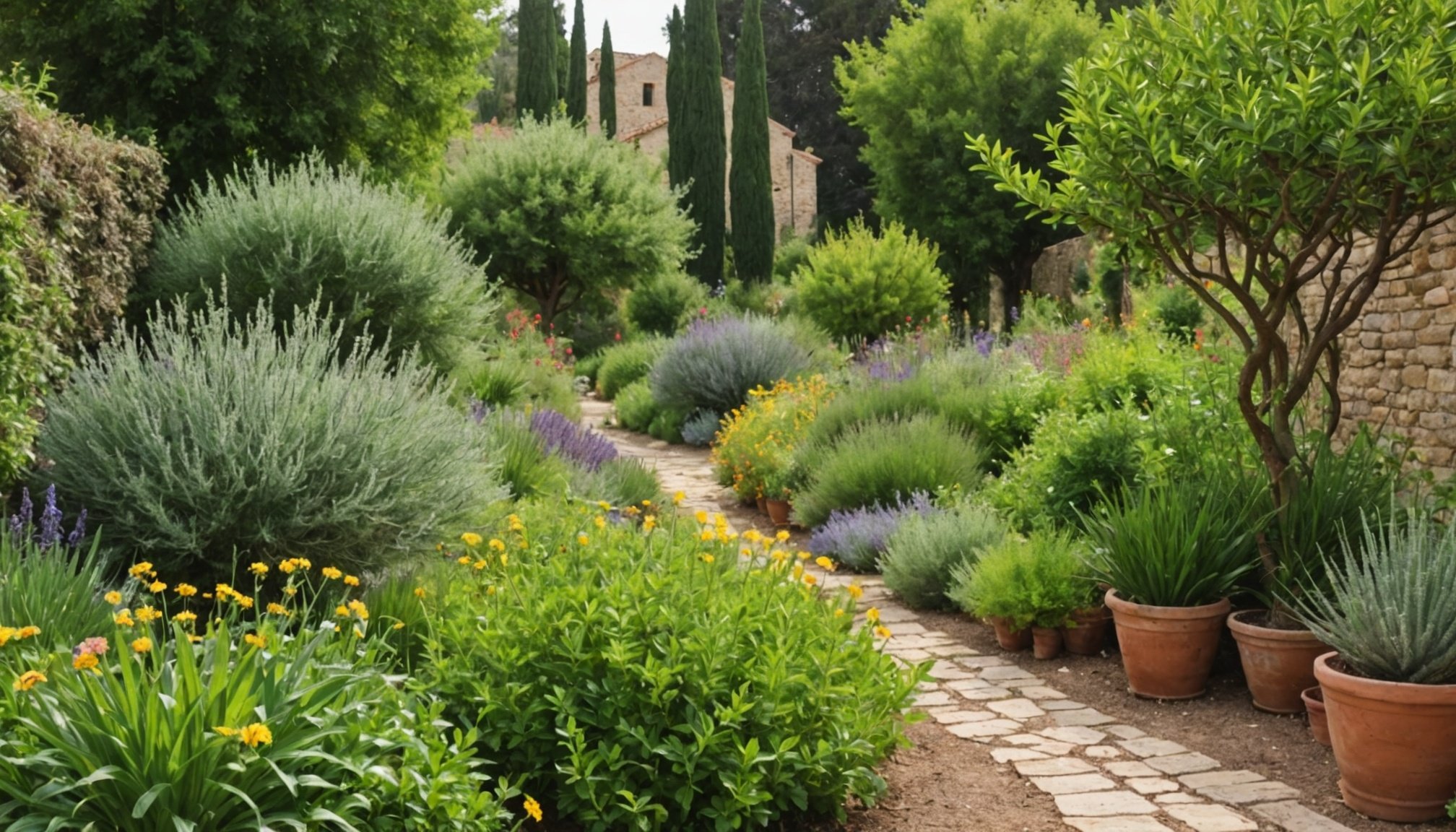Mediterranean herbs, with their vibrant flavors and aromatic scents, can thrive beautifully in the UK's mild climate. This guide offers practical tips for cultivating these delightful plants, ensuring your herb garden flourishes year-round. Discover the best varieties to grow, essential care techniques, and innovative planting ideas that will transform your outdoor space into a fragrant oasis. Unlock the joys of Mediterranean gardening, bringing a taste of the sun-drenched coasts right to your home. Let's cultivate your green thumb together!
Introduction to Mediterranean Herbs
Mediterranean herbs are a delightful addition to any garden, offering both culinary and aesthetic benefits. Despite their sun-loving nature, many of these herbs are surprisingly well-suited to the UK climate. With a thoughtful herb selection, UK gardeners can enjoy a flourishing patch of these aromatic plants.
A découvrir également : Selecting the Perfect Shade Trees for Your Cozy UK Urban Garden: A Comprehensive Guide
Popular Mediterranean herbs that thrive in the UK include rosemary, thyme, and lavender. These herbs are not only resilient but also provide an array of uses in cooking and home remedies. Their ability to withstand cooler temperatures makes them ideal for UK gardening enthusiasts looking to add a touch of the Mediterranean to their landscapes.
Growing Mediterranean herbs comes with several benefits. They are typically drought-tolerant, which reduces the need for frequent watering. This characteristic is particularly advantageous in regions where water conservation is a priority. Additionally, these herbs attract pollinators, contributing to a healthy garden ecosystem.
Dans le meme genre : Ultimate Guide to Installing a Heat Retention System for Your UK Tropical Plant Garden
The key characteristics of Mediterranean herbs include their preference for well-drained soil and sunny positions. They are generally hardy, with robust foliage that can withstand various weather conditions. By selecting the right herbs and providing appropriate care, UK gardeners can successfully cultivate a vibrant and aromatic herb garden.
Soil and Watering Requirements
Understanding the soil preparation and watering techniques is crucial for cultivating Mediterranean herbs in the UK. These herbs thrive in well-drained soil, which prevents root rot and other moisture-related issues. To achieve the ideal soil composition, mix sand or grit into the soil to enhance drainage. This adjustment mimics the natural environment of Mediterranean regions, ensuring the herbs' roots are not waterlogged.
Proper drainage is essential. If your garden soil retains too much water, consider adding organic matter like compost. This not only improves drainage but also enriches the soil with nutrients. Soil amendments such as lime can be beneficial if the soil is too acidic, as Mediterranean herbs prefer a slightly alkaline pH.
When it comes to watering techniques, moderation is key. Mediterranean herbs are drought-tolerant, so overwatering can be detrimental. Water deeply but infrequently, allowing the soil to dry out between sessions. This encourages deep root growth and enhances the plant's resilience. During prolonged dry spells, increase watering frequency, but always ensure the soil remains well-drained. By mastering these soil and watering requirements, gardeners can enjoy a thriving herb garden reminiscent of the Mediterranean landscape.
Planting and Care Instructions
To ensure a successful herb garden, understanding the best planting techniques is essential. Start by selecting a sunny spot with well-drained soil. When planting, space the herbs appropriately to allow for air circulation, which helps prevent diseases. A general rule of thumb is to plant herbs like rosemary and thyme about 12 to 18 inches apart.
Routine herb care involves regular pruning to encourage bushier growth and prevent legginess. Pruning should be done in the growing season, cutting back stems just above a leaf node. This not only maintains the plant's shape but also promotes healthy foliage. Additionally, applying a layer of mulch around the base can help retain moisture and suppress weeds.
Seasonal maintenance tips include adjusting care based on weather changes. In spring, focus on soil enrichment by adding compost. During summer, ensure herbs are not overwatered and check for pests. In autumn, cut back on watering and remove any dead or damaged foliage to prepare for winter. Winter care involves protecting herbs from frost by using cloches or bringing potted herbs indoors. By following these planting and care instructions, gardeners can enjoy a thriving Mediterranean herb garden throughout the year.
Seasonal Considerations
Understanding the growth cycles of Mediterranean herbs is crucial for successful seasonal gardening. These herbs typically experience vigorous growth during spring and summer, making these seasons ideal for active cultivation and care. During this time, herbs like rosemary and thyme benefit from regular pruning to promote healthy growth and prevent overcrowding.
As the seasons change, it's important to adapt care routines to suit the climate impact on herb growth cycles. In autumn, focus on reducing watering and preparing herbs for the colder months. This involves cutting back on pruning and allowing the plants to conserve energy. Protecting herbs from frost is essential, especially in the UK climate, where unexpected cold snaps can occur.
Planning for seasonal herb harvesting ensures a continual supply of fresh herbs throughout the year. During peak growth periods, harvest herbs regularly to encourage new growth and prevent flowering, which can diminish flavour. In winter, consider drying or freezing herbs to preserve their aromatic qualities for use in the colder months.
By understanding and adapting to the growth cycles and seasonal changes, gardeners can maintain a thriving Mediterranean herb garden year-round, ensuring a steady supply of fresh and flavourful herbs.
Pest Management and Design Inspiration
Cultivating Mediterranean herbs in the UK can be a rewarding experience, but pest control is essential to maintaining a healthy garden. Common pests such as aphids, spider mites, and whiteflies can affect these herbs, potentially stunting their growth or damaging foliage. To manage these pests effectively, consider using natural remedies like neem oil or insecticidal soap, which are safe for both the plants and the environment. Regularly inspect herbs for signs of infestation and remove any affected leaves to prevent the spread.
Incorporating companion planting is a strategic way to enhance pest management. Planting herbs like basil and mint alongside Mediterranean varieties can naturally deter pests due to their strong scents. Companion planting not only aids in pest control but also promotes a balanced garden ecosystem.
When it comes to garden design, Mediterranean herbs offer endless possibilities for creating visually appealing spaces. Consider arranging herbs in geometric patterns or using raised beds for a structured look. Incorporating elements like terracotta pots and gravel pathways can further enhance the Mediterranean aesthetic. By combining effective pest management with thoughtful garden design, you can create a beautiful and thriving herb garden.











